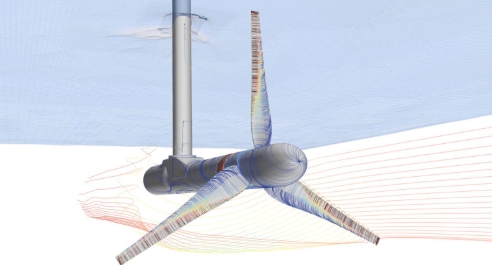
The initiative involved twelve groups from academia and industry, who submitted computational fluid dynamics (CFD) results using various modeling approaches, from low-fidelity methods to high-fidelity blade-resolved CFD. Cape Horn Engineering utilized Siemens’ STAR-CCM+ software for high-resolution simulations, incorporating the full rotor geometry, nacelle, tower, tank walls, and water surface effects. Their approach achieved precise results with a mesh size of approximately 3.5 million cells, using automatic mesh refinement and a hybrid meshing strategy. Simulations were completed in four to five hours on 32-core systems.
Cape Horn Engineering stated: “The solutions of CHE-BR-uRANS were found to be very effective with a significantly lower cell count compared to other methods, whilst returning some of the most accurate solutions.” Their results closely matched experimental data, with average differences in power and thrust coefficients of 0.67% and 2.10% in low turbulence conditions, and 2.02% and 2.74% in elevated turbulence. All results fell within the 95% confidence range of the experimental data.
The firm’s submission included a comprehensive verification and validation study, reporting numerical uncertainties below 1% for key parameters. Compared to other participants, Cape Horn Engineering’s approach stood out for its accuracy and efficiency, as many others excluded elements like tank walls or water surface effects. The study’s findings are expected to reduce design conservatism and enhance numerical modeling for offshore renewable energy applications.
In addition to tidal energy, Cape Horn Engineering applies its CFD expertise to wind energy rotors, floating platforms, wave energy structures, and various marine vessels. The company also recently validated its CFD analysis for Spiralis Energy’s Axial Skelter tidal test rig, achieving a match to experimental data with less than 1.5% deviation.